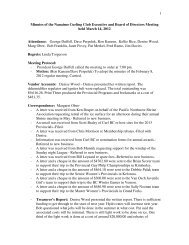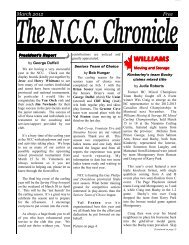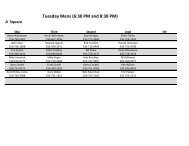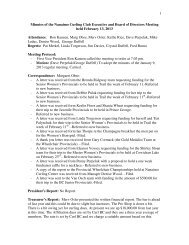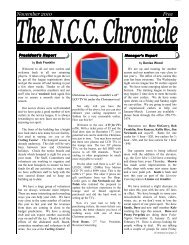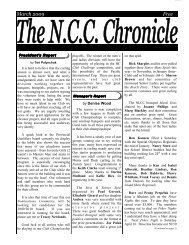Code of Conduct Form - Nanaimo Curling Club
Code of Conduct Form - Nanaimo Curling Club
Code of Conduct Form - Nanaimo Curling Club
You also want an ePaper? Increase the reach of your titles
YUMPU automatically turns print PDFs into web optimized ePapers that Google loves.
<strong>Nanaimo</strong> <strong>Curling</strong> <strong>Club</strong><br />
Junior Program<br />
Introduction<br />
The <strong>Nanaimo</strong> <strong>Curling</strong> <strong>Club</strong> Junior Program will endeavour to ensure that every athlete<br />
entering the sport will have the potential for a positive, individualized experience no<br />
matter what their level <strong>of</strong> participation or competition. The program will allow athletes<br />
to receive timely and appropriate development whether they are involved for<br />
recreational activity or whether they have podium aspirations.<br />
The purpose <strong>of</strong> this document is to communicate the principles and activities by which<br />
that will be accomplished.<br />
Mission<br />
The <strong>Nanaimo</strong> <strong>Curling</strong> <strong>Club</strong> Junior Program provides a welcoming, accessible<br />
environment for youth to build friendships, sportsmanship and skill development<br />
through the sport <strong>of</strong> curling.<br />
Values<br />
Goals<br />
1. Our primary focus will be to introduce and promote the sport <strong>of</strong> curling to youth.<br />
2. We will be accountable for our actions on and <strong>of</strong>f the ice.<br />
3. We will strive at all times to demonstrate the highest ethical manner in our<br />
activities.<br />
4. We will represent the <strong>Nanaimo</strong> <strong>Curling</strong> <strong>Club</strong> and the community at all levels (local,<br />
provincial and national) with pride, pr<strong>of</strong>essionalism and integrity.<br />
5. We will treat everyone (team-mates, opposition, coaches, <strong>of</strong>ficials and spectators)<br />
with fairness and respect at all times.<br />
6. We will encourage volunteerism, sportsmanship, teamwork and a positive social<br />
environment.<br />
1. To develop curlers for life.<br />
2. To coach the person, not just the athlete.<br />
3. To increase participation.<br />
4. To increase the positive involvement <strong>of</strong> adults (parents, caregivers and volunteers).<br />
Every athlete entering the sport will have the potential for a positive, individualized<br />
experience no matter what their level <strong>of</strong> participation or competition, and the athlete with<br />
podium aspiration and promise will receive timely and appropriate development.
Objectives<br />
1. To have 2 qualified coaches per sheet<br />
<br />
The Junior <strong>Curling</strong> Program will reimburse adults who take a recognized CurlBC<br />
coaching course and who agree to contribute 50 hours <strong>of</strong> support to the program<br />
for at least one season.<br />
2. To develop and implement programs for recreational curlers<br />
<br />
<br />
The season will be split into 4 sessions (see Appendix E for details) with the aim <strong>of</strong><br />
improving the overall skill levels across all aspects <strong>of</strong> the game (technical, strategy,<br />
team dynamics).<br />
Each practice will be fully structured (Appendix D) and each curler must actively take<br />
part in all aspects <strong>of</strong> the practice including:<br />
• Off-ice warm up activities<br />
• Pre-game drills<br />
• Games<br />
• Post game warm down<br />
<br />
<br />
A list <strong>of</strong> upcoming bonspiels will be posted along with a sign-up sheet for athletes to<br />
express interest in participating. Teams may be organized by the instructors/coaches.<br />
Parents <strong>of</strong> the curlers are responsible to arrange transportation to and from the<br />
bonspiel location (singly or in carpool). At least one adult (parent or coach) will be<br />
assigned to oversee the NCC participants at each event.<br />
The NCC Junior program will work with the Island <strong>Curling</strong> Development League to<br />
support the opportunity for returning curlers to participate in this league. Curlers are<br />
responsible for the entry fee (currently estimated at $250 per team). The NCC Junior<br />
Program will support the ICDL with funds to cover costs <strong>of</strong> trophies, year end wind-up<br />
and other incidental expenses. This support will be based on the number <strong>of</strong> teams<br />
representing the NCC Junior Program.<br />
3. To provide opportunities to explore and pursue competitive/playdown curling.<br />
<br />
<br />
Returning curlers will be given the opportunity to try-out for a juvenile team (1 male and<br />
1 female 16 years <strong>of</strong> age and under on December 31 <strong>of</strong> the competition year) with the<br />
goal <strong>of</strong> participating in Juvenile zone playdowns. This team will be chosen by the<br />
instructors and coaches in the Junior Program in early November. The aim <strong>of</strong> this<br />
initiative is to allow these curlers to experience what is required to compete at this level<br />
so they can make an informed decision on whether or not this is a goal they wish to<br />
pursue. The NCC Junior Program will provide a qualified coach for each team.<br />
Returning curlers wishing to participate in zone playdowns with a Juvenile or Junior<br />
team <strong>of</strong> their choice will be directed to coaches who have expressed interest in working<br />
with such a team.
Curlers who are representing the <strong>Nanaimo</strong> <strong>Curling</strong> <strong>Club</strong> in either juvenile or junior<br />
playdowns shall be entitled to have all (twice a week curler) or half (once a week<br />
curler) <strong>of</strong> their entry fee paid by the Junior program. Curlers must be in good standing<br />
with respect to attendance (minimum 90%) and participation (subjective assessment by<br />
the coaches). No curler may claim the entry fee for more than 1 playdown event.<br />
4. To provide opportunities to participate in adult evening leagues.<br />
<br />
Returning curlers who express an interest, and are deemed ready (skill, age and<br />
attitude) to participate in adult evening leagues will be assisted to be placed on such a<br />
team by the Junior Program and the NCC main club.<br />
5. To develop and implement a skills measurement/feedback program.<br />
<br />
<strong>Form</strong>al skill development will be tested and evaluated through the evaluation feedback<br />
on drills as well as the CurlBC Skill Awards Program held during the last 2-3 weeks <strong>of</strong><br />
the season. The Skills Award consists <strong>of</strong> a written component and an on-ice<br />
component. The written component must be completed and passed before the on-ice<br />
component can be completed.<br />
6. To develop and implement codes <strong>of</strong> conduct for athletes, parents, coaches and<br />
volunteers.<br />
<br />
All participants will sign and abide by a code <strong>of</strong> conduct (See Appendices A, B, and C).<br />
Violations <strong>of</strong> the code may result in penalties ranging from a reprimand to expulsion<br />
from the program <strong>of</strong> the <strong>of</strong>fending individual (See Appendix F).<br />
7. To develop and implement a leadership program.<br />
<br />
Curlers who have been in the program for more than 2 years will be required to<br />
demonstrate leadership through one or more <strong>of</strong> the following:<br />
• Mentoring new curlers.<br />
• Organizing and leading the warm-up.<br />
• Leading the drills component <strong>of</strong> a practice under the guidance and supervision <strong>of</strong> a<br />
qualified coach/instructor.<br />
• Proactively supporting all curlers on their team in a positive and constructive<br />
manner.<br />
• Bringing to the attention <strong>of</strong> the instructors any issues or concerns that he/she has<br />
about the program.<br />
8. To provide a safe environment for all to participate.
Appendix A<br />
<strong>Nanaimo</strong> <strong>Curling</strong> <strong>Club</strong><br />
Junior <strong>Curling</strong> Program<br />
Athlete <strong>Code</strong> Of <strong>Conduct</strong><br />
Athletes have the right to:<br />
<br />
<br />
<br />
<br />
<br />
<br />
<br />
<br />
<br />
<br />
have fun through sport;<br />
participate at a level that is consistent with ability;<br />
have qualified, sensitive leadership;<br />
participate in a safe and healthy environment;<br />
play at the appropriate competition level;<br />
have the opportunity to participate in sport regardless <strong>of</strong> ability or income level;<br />
proper preparation for participation in the sport;<br />
an equal opportunity to strive for success;<br />
be treated with dignity by all involved;<br />
say ‘No’<br />
As an athlete I agree to:<br />
<br />
<br />
<br />
<br />
<br />
<br />
<br />
<br />
play by the rules and in the spirit <strong>of</strong> the game.<br />
control my temper - fighting and “mouthing <strong>of</strong>f ” can spoil the activity for everybody.<br />
respect my opponents.<br />
do my best to be a true team player.<br />
remember that winning isn’t everything - that having fun, improving skills, making friends and doing my<br />
best are also important.<br />
acknowledge all good plays/performances - those <strong>of</strong> my team and <strong>of</strong> my opponents.<br />
participate because I want to, not just because my parents or coaches want me to.<br />
remember that coaches and <strong>of</strong>ficials are there to help me and accept their decisions and show them<br />
respect.<br />
. __________________________________<br />
signature <strong>of</strong> athlete
Appendix B<br />
<strong>Nanaimo</strong> <strong>Curling</strong> <strong>Club</strong><br />
Junior <strong>Curling</strong> Program<br />
Coach’s <strong>Code</strong> Of <strong>Conduct</strong><br />
Coaches Have a Responsibility to:<br />
1. Treat everyone fairly within the context <strong>of</strong> their activity, regardless <strong>of</strong> gender, place <strong>of</strong> origin, colour,<br />
sexual orientation, religion, political belief or economic status.<br />
2. Direct comments or criticism at the performance rather than the athlete.<br />
3. Consistently display high personal standards and project a favourable image <strong>of</strong> their sport and <strong>of</strong><br />
coaching.<br />
Refrain from public criticism <strong>of</strong> fellow coaches; especially when speaking to the media or<br />
recruiting athletes.<br />
Abstain from the use <strong>of</strong> tobacco products while in the presence <strong>of</strong> her/his athletes and<br />
discourage their use by athletes.<br />
Abstain from drinking alcoholic beverages when working with athletes.<br />
Discourage the use <strong>of</strong> alcohol in conjunction with athletic events or victory celebrations at the<br />
<br />
playing site.<br />
Refrain from the use <strong>of</strong> pr<strong>of</strong>ane, insulting, harassing or otherwise <strong>of</strong>fensive language in the<br />
conduct <strong>of</strong> his/her duties.<br />
4. Ensure that the activity being undertaken is suitable for the age, experience, ability and fitness level <strong>of</strong><br />
the athletes and educate athletes as to their responsibilities in contributing to a safe environment.<br />
5. Communicate and co-operate with registered medical practitioners in the diagnoses, treatment and<br />
management <strong>of</strong> their athletes' medical and psychological problems. Consider the athletes' future health<br />
and well being as foremost when making decisions regarding an injured athletes' ability to continue<br />
playing or training.<br />
6. Recognize and accept when to refer athletes to other coaches or sport specialists. Allow athletes' goals<br />
to take precedence over their own.<br />
7. Regularly seek ways <strong>of</strong> increasing pr<strong>of</strong>essional development and self-awareness.<br />
8. Treat opponents and <strong>of</strong>ficials with respect, both in victory and defeat and encourage athletes to act<br />
accordingly. Actively encourage athletes to uphold the rules <strong>of</strong> their sport and the spirit <strong>of</strong> such rules.<br />
9. In the case <strong>of</strong> minors, communicate and co-operate with the athlete's parents or legal guardians,<br />
involving them in management decisions pertaining to their child's development.<br />
10. Be aware <strong>of</strong> the academic and social pressures placed on athletes and conduct practices and games in<br />
a manner so as to allow overall personal growth and success.<br />
Coaches Must:<br />
1. Ensure the safety <strong>of</strong> the athletes with whom they work.<br />
2. At no time become intimately and/or sexually involved with their athletes. This includes requests for<br />
sexual favours or threat <strong>of</strong> reprisal for the rejection <strong>of</strong> such requests.<br />
3. Respect athlete's dignity; verbal or physical behaviours that constitute harassment or abuse are<br />
unacceptable (definition <strong>of</strong> harassment is attached).<br />
4. Never advocate or condone the use <strong>of</strong> drugs or other banned performance enhancing substances.<br />
Never provide under age athletes with alcohol.<br />
Harassment<br />
Harassment takes many forms but can generally be defined as behaviour including comments and/ or conduct<br />
which is insulting, intimidating, humiliating, hurtful,, malicious, degrading or otherwise <strong>of</strong>fensive to an individual<br />
<strong>of</strong> groups or individuals or which creates an uncomfortable environment.<br />
Harassment includes but is not limited to:<br />
<br />
written or verbal abuse or threats;
sexually oriented comments;<br />
racial or ethnic slurs;<br />
unwelcome remarks, jokes, innuendoes, or taunting about a person's body, attire, age, marital status,<br />
ethnic or racial origin, religion etc.;<br />
displaying <strong>of</strong> sexually explicit, racist or other <strong>of</strong>fensive or derogatory material;<br />
sexual, racial, ethnic or religious graffiti; practical jokes which cause awkwardness or embarrassment,<br />
endanger a person's safety, or negatively affect performance;<br />
unwelcome sexual remarks, invitations or requests whether indirect or explicit, or intimidation; leering<br />
(suggestive staring), or other obscene or <strong>of</strong>fensive gestures; condescension, paternalism or patronizing<br />
behaviour which undermines self-respect or adversely affects performance or working conditions;<br />
physical conduct such as touching, kissing, patting, pinching, etc.;<br />
vandalism;<br />
physical assault<br />
Coaches <strong>Code</strong> Of Ethics<br />
Respect For Participants<br />
The principle <strong>of</strong> respect for participants challenges coaches to act in a manner respectful <strong>of</strong> the dignity <strong>of</strong> all<br />
participants in sport. Fundamental to this principle is the basic assumption that each person has value and is<br />
worthy <strong>of</strong> respect.<br />
Responsible Coaching<br />
The principle <strong>of</strong> responsible coaching carries the basic ethical expectation that the activities <strong>of</strong> coaches will<br />
benefit society in general and participants in particular and will do no harm. Fundamental to the implementation<br />
<strong>of</strong> this principle is the notion <strong>of</strong> competence - responsible coaching (maximizing benefits and minimizing risks to<br />
participants) is performed by coaches who are "well prepared and current" in their discipline.<br />
Integrity in Relationships<br />
Integrity means that coaches are expected to be honest, sincere and honourable in their relationships with<br />
others. Acting on these values is most possible when coaches possess a high degree <strong>of</strong> self-awareness and the<br />
ability to reflect critically on how their perspectives influence their interactions with others.<br />
Honouring Sport<br />
The principle <strong>of</strong> honouring sport challenges coaches to recognize, act on and promote the value <strong>of</strong> sport for<br />
individuals and teams and for society in general.<br />
_____________________________<br />
Signature Of Coach
Appendix C<br />
<strong>Nanaimo</strong> <strong>Curling</strong> <strong>Club</strong><br />
Junior <strong>Curling</strong> Program<br />
Parent’s <strong>Code</strong> Of <strong>Conduct</strong><br />
Preamble<br />
The essential elements <strong>of</strong> character-building and ethics in sports are embodied in the concept <strong>of</strong> sportsmanship<br />
and six core principles:<br />
• Trustworthiness,<br />
• Respect,<br />
• Responsibility,<br />
• Fairness,<br />
• Caring, and<br />
• Good Citizenship.<br />
The highest potential <strong>of</strong> sports is achieved when competition reflects these “six pillars <strong>of</strong> character.”<br />
If children are to grow and develop in their sport or physical activity, an environment <strong>of</strong> positive<br />
communication and respect must exist. Parents should observe the following <strong>Code</strong> <strong>of</strong> <strong>Conduct</strong> with their<br />
child athletes. Please read, understand, sign and return this form to the Head Coach <strong>of</strong> the program.<br />
Any parent guilty <strong>of</strong> improper conduct at any time will be asked to leave the sports facility and be suspended<br />
from the following game. Repeat violations may cause a multiple game suspension, or the season forfeiture <strong>of</strong><br />
the privilege <strong>of</strong> attending all games.<br />
I Will<br />
• remember that my child plays sport for his or her enjoyment, not for mine.<br />
• encourage my child to play by the rules and to resolve conflicts without resorting to hostility or violence.<br />
• teach my child that doing one’s best is as important as winning, so that my child will never feel defeated<br />
by the outcome <strong>of</strong> a game/event.<br />
• make my child feel like a winner every time by <strong>of</strong>fering praise for competing fairly and trying hard.<br />
• never ridicule or yell at my child for making a mistake or losing a competition.<br />
• remember that children learn best by example. applaud good players’ performances by both my child’s<br />
team and their opponents.<br />
• not force my child to participate in sports.<br />
• never question the <strong>of</strong>ficial’s judgement or honesty in public.<br />
• support all efforts to remove verbal and physical abuse from children’s sporting activities.<br />
• respect and show appreciation for the trained volunteer coaches who give their time to provide sport<br />
activities for my child, understanding that I have a responsibility to be a part <strong>of</strong> my child’s development.<br />
I agree to Play Fair. ________________________________________<br />
(signature <strong>of</strong> parent)
Appendix D<br />
Practice Structure<br />
Those sheet <strong>of</strong> ice that are to be pebbled by the ice technician may not be used by any curler before<br />
practice begins. Curlers must be in full gear and ready prior to the scheduled start time.<br />
Warm-Up<br />
<br />
<br />
<br />
<br />
Warm-up will be organized and led by a mentoring curler on a rotational basis.<br />
Warm-ups contain elements <strong>of</strong> aerobic exercises and stretches.<br />
Warm-up will be done as a group and should last 5 – 10 minutes<br />
No curler may go onto the ice without completing a full warm-up (even if they are late arriving)<br />
News<br />
<br />
After warm up is complete curlers will gather around the front desk area where the instructors/coaches<br />
will outline any special instructions and pass along any pertinent news.<br />
Drills<br />
<br />
<br />
<br />
<br />
Every curler will be assigned a skill level rank such as working towards red, working towards blue, etc).<br />
As curlers progress throughout the year, they could be advanced to the next level even though they may<br />
not have <strong>of</strong>ficially passed the badge test.<br />
Drills for the day will be posted along with the sheet number and ranking for that sheet. Curlers are<br />
expected to go to the sheet that matches their rank.<br />
Drills will last a minimum <strong>of</strong> 15 minutes with the coaches actively providing feedback.<br />
Suggestions for pre-game drills can be made to any <strong>of</strong> the instructors who will, to the best <strong>of</strong> their ability,<br />
incorporate them into future practices<br />
Games<br />
<br />
<br />
After drills curlers will move to the sheet on which their game has been scheduled.<br />
If an end is complete and there is more than 15 minutes left in the practice session, you must start a<br />
new end.<br />
Who is on which team and in what position at any time is at the discretion <strong>of</strong> the coaches and instructors.<br />
To the extent possible a schedule <strong>of</strong> games will be posted in advance. Curlers are expected to read the<br />
schedule and be on the proper ice at the right time for on-ice drills to be followed by the game.<br />
Warm Down<br />
<br />
After the game is concluded, both teams and the coaches (if available) will convene in the lobby for<br />
warm down and debriefing.<br />
Some practices may include an <strong>of</strong>f-ice component (e.g. discussion on strategy, positional play, etiquette, etc.).<br />
Except for illness, previous appointments or family emergency, each curler must attend and fully participate in all<br />
aspects <strong>of</strong> the program. Curlers unable to make practice must call either the Junior <strong>Curling</strong> Coordinator or the<br />
<strong>Curling</strong> <strong>Club</strong> to notify them <strong>of</strong> the impending absence.<br />
Examples <strong>of</strong> unacceptable reasons include, but are not limited to:<br />
<br />
<br />
<br />
Practice with another team.<br />
Reluctance to play with another curler.<br />
Tired (physically or mentally) from playing in an outside event on the weekend prior to the day <strong>of</strong><br />
practice.
Appendix E<br />
Season Structure<br />
1. Teams<br />
2. Sessions<br />
Teams will be made up by the coaches. Each curler will be assigned to a position on a Monday<br />
and/or Thursday team. Curlers will be assigned to one or more teams in one or more positions<br />
throughout the season.<br />
Monday teams will be based on skill level and experience (A & B groups). The A teams will play<br />
each other and the B teams will play each other.<br />
Thursday teams will be made up from all levels so that each team has an equitable mix <strong>of</strong><br />
experienced and novice curlers. A draw schedule will be posted.<br />
Each curler is responsible to be available for their scheduled games. Not showing up means your<br />
team might have to play short or even default the game. Coaches will not be revamping teams on<br />
the fly.<br />
The season runs from early October to Mid-March and will be divided into 4 sessions.<br />
Session 1<br />
Runs from early October to the end <strong>of</strong> October<br />
Returning Curlers<br />
<br />
<br />
Skills assessment and review<br />
Placed on a Monday team and/or a Thursday team<br />
New Curlers<br />
<br />
<br />
Introduction to the game. Learn how to slide, sweep, deliver a stone and the general rules <strong>of</strong><br />
the game.<br />
Most <strong>of</strong> each practice will be spent on skill development with a 1 or 2 end game at the end.<br />
Session 2<br />
Runs from the beginning <strong>of</strong> November to Christmas break. All curlers will be assigned to Monday<br />
and/or Thursday teams.<br />
Session 3<br />
Runs from early January to the end <strong>of</strong> February. All curlers will be assigned to Monday and/or Thursday<br />
teams.<br />
Session 4<br />
Runs from late February until mid March. The written component <strong>of</strong> the CurlBC Skill Awards Program<br />
will be handed out about 1 week before the last week <strong>of</strong> session 3. On ice testing will begin the first<br />
week <strong>of</strong> March. No other games or practices will be scheduled although curlers not scheduled for<br />
testing may practice or convene pick-up games on any available sheet <strong>of</strong> ice.<br />
Other<br />
Bring a friend day will be scheduled twice during the season; once in session 2 and once in session 4.
Appendix F<br />
Failure To Comply With <strong>Code</strong> Of <strong>Conduct</strong><br />
Overview<br />
Youth sport seems to have changed over the years. Today athletes, coaches, parents and spectators <strong>of</strong>ten<br />
need to be reminded <strong>of</strong> the expectations placed on them. It is in the child's and team's best interest if everyone<br />
adheres to a code <strong>of</strong> conduct that upholds the highest standard <strong>of</strong> ethics and good sportsmanship. Youth sports<br />
provide a unique opportunity to teach children the value <strong>of</strong> sportsmanship and <strong>of</strong>fers everyone the opportunity to<br />
model appropriate behaviour.<br />
Over the past few years nearly every sports organization has seen the need to have a process whereby all<br />
involved sign a formal contract. The NCC Junior Program should conform to this practice. Everyone involved<br />
hopes that enforcement <strong>of</strong> penalties is not necessary. However we have to be prepared to administer them<br />
should the situation warrant.<br />
Process<br />
Everyone in the program sincerely hopes that no one acts in any manner which contravenes the codes <strong>of</strong><br />
conduct. However it is necessary to establish a documented and clearly defined process to handle any issues<br />
that do arise.<br />
• Anyone observing behaviour by an athlete, coach, parent or volunteer which contravenes or appears to<br />
contravene the code <strong>of</strong> conduct must report the incident to any <strong>of</strong> the following at the earliest<br />
opportunity<br />
- Junior Program Co-ordinator,<br />
- Any coach/instructor,<br />
- Adult in charge at bonspiels.<br />
• The Junior Coordinator will lead an investigation to determine the veracity <strong>of</strong> the allegation.<br />
• If the investigation upholds the contravention, the <strong>of</strong>fender may be subject to measures which include,<br />
but are not limited to:<br />
1. Informal reprimand (oral)<br />
2. <strong>Form</strong>al reprimand (written)<br />
3. Temporary suspension from the program<br />
4. Permanent suspension from the program<br />
Full or partial refunds for any suspension shall not be granted.



